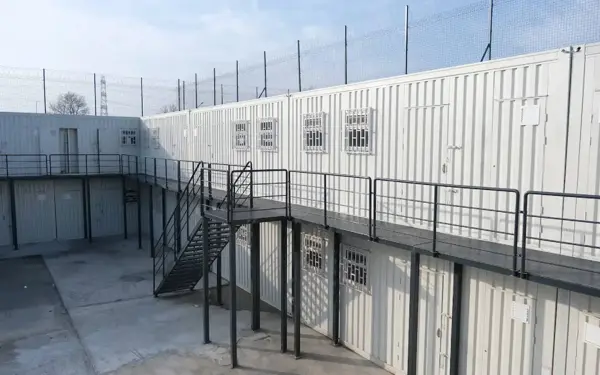Click to read the article in Turkish / Kurdish
As the court of appeals overturned the acquittals in the Gezi trial, all 16 defendants are standing trial again. The first hearing of the Gezi retrial began at the İstanbul 30th Heavy Penal Court today (May 21).
The court board has announced its interim ruling after hearing the statements of defendants and their attorneys. By a majority of votes, the court board has ruled that Osman Kavala shall remain behind bars.
Presiding Judge Sercan Karagöz has expressed a dissenting opinion to the ruling of continuation of arrest given for Kavala. In the trial held in Silivri, Karagöz also expressed an opinion in favor of Yiğit Aksakoğlu's release. Then, he became one of the judges sent from the court board.
The next hearing of the case will be held on August 6, 2021.
10-minute recess before the hearing started
As a 30-person courtroom was allocated for the trial of 16 defendants, several people from the audience, journalists and MPs could not enter the room. Audience members started waiting standing.
The bailiff first said that the audience would be taken out of the room and allowed to enter it again. As the courtroom was not emptied, the Presiding Judge came to the room and said, "I want to hear this case today, but it is not possible for us to do it in these conditions amid the COVID-19 outbreak. Please leave the courtroom. We will take you again to the courtroom by giving priority to the relatives of the defendants."
The hearing was recessed for 10 minutes before starting.
Judge: We can come to the same conclusion
10 minutes later, the Presiding Judge came back to the courtroom. He said that the presumption of innocence is important and that he wanted to hear all defendants of the case. He also noted that they had written to the İstanbul 14th Heavy Penal Court for the allocation of a larger courtroom, but the latter did not give a positive response to the request.
Referring to the request for merging the Gezi Case and Çarşı Case, the Judge indicated that the cases can be merged if a physical connection is detected between the two. Talking about the ruling of reversal, the Judge said, "It is not possible for us to defy it. The procedural errors must be rectified. But it doesn't mean that we cannot come to the same conclusion."
In the meantime, it was seen that the attorneys of the Directorate General of Security attended the hearing as well.
The Judge asked Mücella Yapıcı about the ruling of reversal. Mücella Yapıcı, said, "I reject the decision of reversal. I demand my acquittal. I have twice been acquitted in this case and that verdict was finalized. The decision of reversal must be annulled immediately."
Atalay: Give an immediate ruling of acquittal
The judge asked Can Atalay, another previously acquitted defendant, about the ruling of reversal. Can Atalay briefly said:
"There must be an immediate verdict of acquittal in this case. The Court of Cassation is trying to gather everything under the sun in this file."
"It was only yesterday that the 16th Penal Chamber of the Court of Cassation softened its jurisprudence regarding Fethullahist mob. But when it comes to Gezi, they want to stick everything under the sun on it.
"There was only one investigation when they arrested Kavala. But when he was acquitted, the person in the highest post in the country, President Erdoğan, commented. We cannot live in this country as long as there is such direct intervention in the process of law.
"Gezi is the symbol of the peoples of this country taking hold of their own will. Gezi is proof that freedom, equality and justice are still possible. We will continue to defend Gezi."
Kahraman: Gezi put on trial in its entirety
The Presiding Judge then asked Tayfun Kahraman about the ruling of reversal. Tayfun Kahraman also demanded that the court board defy the ruling of reversal given by the court of appeals: "There are no claims of legal worth in this file. The Gezi resistance in its entirety is being put on trial. We expect you to stand by the previous verdict of acquittal."
Kavala: A script which lost its plausibility
Arrested businessperson and rights defender Osman Kavala took the floor after Tayfun Kahraman. Osman Kavala indicated that he wanted to talk about his imprisonment, but as he was asked about the ruling of acquittal, he would make a statement about this issue.
"The ruling of reversal was taken to help combine a number of files. With no evidence, the claim is made that we plotted to overthrow the government," he said, adding: "This amounts to reviving a script first devised eight years ago, which lost its plausibility with the verdict of acquittal."
Hearing recessed
The hearing continued with the statements of defendants' attorneys. The attorneys of Çiğdem Mater Utku, Mine Özerden, Yiğit Aksakoğlu and Yiğit Ekmekçi made their statements against the ruling of reversal. The hearing was recessed following the statements.
Prosecutor demands Kavala's continued arrest
Following the recess, the prosecutor of the hearinf pronounced the opinion as to the accusations and demanded that the execution of the defendants who are currently abroad be awaited. The prosecutor also demanded the continued arrest of Osman Kavala. Following this opinion, Osman Kavala started making his statement as to his imprisonment.
'I was not surprised by reversal of acquittals'
Osman Kavala made the following statement as to his imprisonment:
"With the merging of the cases, the judicial process, which started 3.5 years ago on the basis of the scenario that the Gezi events were a conspiracy to overthrow the government, is entering a new stage.
"As I mentioned several times before, the copyright of the Gezi indictment belongs to the former members of the Police and Judiciary who are currently being prosecuted on the charges of membership in 'Fetullah Terrorist Organization'.
"As it is stated in the documents dated 14 -15 June 2013, which are included the annex of the indictment, the fiction that Gezi events are a conspiracy in which I am one of the main actors was originally produced by the Department of Anti-smuggling and Organized Crime.
"The same group of people also happens to be the ones who conducted the unlawful wiretappings with extrajudicial motivations and utilized them to deliberately misleading justice.
"Given that the fiction of Gezi events being a conspiracy has been adopted and politically utilized by the government, I was not surprised that the acquittal decisions that belie this narrative were overturned.
"Despite the fact that there is no evidence to incriminate me, that I was acquitted in the Gezi Trial, and the ECtHR found a violation in my application and called for my immediate release; my release has been precluded also in line with this narrative in order to sustain the perception in the public eye that I planned, organized and financed the Gezi protests.
"Charges against me keep altering... As if a baton handed over in a relay race, various judges and courts have been carrying over my arrest, refraining from dropping it to the ground.
"Undoubtedly, the prosecutor who prepared the recent indictment also recognizes – and even admits – that there is no evidence in support of the espionage allegation, which has been invented to circumvent the ECtHR decision as surfaced by now.
"The prosecutor justifies this situation by asserting that the alleged espionage activities were carried out in great secrecy. This argumentation brings to mind the argument of the prosecutor in the play 'The Crucible' written by Arthur Miller during the McCarthy era, who asserts that there is no need to look for any evidence or witness to put forth for witchcraft, as it is, by nature, an activity that could not be seen.
'I hope your court ends this situation'
"At the same time, the prosecutor develops a distinct concept of espionage that is different from its definition in the dictionary and the law, one that relies on an antidemocratic conspiracy theory that civil society organizations are used for the purposes of espionage. The definition of espionage presented in the indictment is quite different from that in our laws.
"In terms of its ambiguity and suitability for arbitrary practices, the one in the indictment rather resembles the concept of 'Landesverrat' (treason against the country) which was also utilized for charges of espionage in Germany during the Nazi period.
"During that period, the duty of the judge was to sentence the person, whose action was regarded incompatible with the 'public conscience', by picking the law most convenient to enable the sentencing even if the act of the accused person did not fit the description of the crime in the law.
"Over that period, politics was effective at every stage of the judicial process, determining what the public conscience should be and correcting the court decisions in line with it. For example, Martin Niemöller, a priest critical of the Nazi regime, was kept in a concentration camp until the end of the war following his acquittal which was found politically inconvenient.
"In the 'Justice Case' in which judges and prosecutors of the Nazi legal establishment were brought before the court in 1947, it was stated that 'the dagger of the assassin was concealed beneath the robe of the jurist.'
"One thinks of this statement in a situation where a person is deprived of his freedom by abusing power as stated by the ECtHR decision on the case, and where justice is deliberately misled for the continuation of this deprivation through extrajudicial practices.
"I hope that your Court will put an end to this situation."
Next hearing on August 6
Following Kavala's statement, his attorneys İlkhan Koyuncu, Köksal Bayraktar and Tolga Aytöre made their statements. The court board recessed the hearing for at least an hour for the interim ruling.
The court board has announced its interim ruling after a recess of nearly 2 hours. The board has ruled that the imprisonment of Osman Kavala shall continue. The ruling has been handed down by a majority of votes. Presiding Judge Sercan Karagöz has expressed a dissenting opinion, indicating that Osman Kavala should be released.
The court has also ruled that the detention of Henri J. Barkey shall be awaited. İnanç Ekmekçi's request for letters rogatory has been rejected. The next hearing of the case will be held on August 6, 2021.
CLICK - Gezi trial begins again today
About Gezi trialThe Gezi trial began again on May 21, 2021 as the court of appeals overturned the verdicts of acquittal given by the local court. Arrested for over 1,200 days, businessperson and rights defender Osman Kavala and 15 other defendants appeared before the judge at the İstanbul 30th Heavy Penal Court in Çağlayan on charge of "attempting to overthrow the government." Here is a brief overview of the judicial process: Who is on trial?Osman Kavala, Mücella Yapıcı, Can Atalay, Tayfun Kahraman, Ali Hakan Altınay, Yiğit Aksakoğlu, Yiğit Ali Ekmekçi, Çiğdem Mater Utku and Mine Özerden, who were acquitted in the first trial; and Can Dündar, Mehmet Ali Alabora, Ayşe Pınar Alabora, Gökçe Tüylüoğlu, Handan Meltem Arıkan, Hanzade Hikmet Germiyanoğlu and İnanç Ekmekçi, whose files were separated, but have been merged again afterwards. Even though he was acquitted in the Gezi trial, Osman Kavala has been behind bars in Silivri Prison at the outskirts of İstanbul for over 1,200 days. Yiğit Aksakoğlu also served 220 days behind bars ias part of the Gezi trial. Who are the aggrieved parties?In the Gezi trial, where rights defenders were acquitted, the members of the 61st term cabinet, which was established in 2011, were referred to as the complainant aggrieved parties in the indictment. On the list of the aggrieved parties were the then PM Recep Tayyip Erdoğan, the then Deputy Prime Ministers Bülent Arınç, Ali Babacan, Beşir Atalay, Bekir Bozdağ, Emrullah İşler and the then Ministers Binali Yıldırım, Fatma Şahin, Egemen Bağış, Nihat Ergün, Faruk Çelik, Erdoğan Bayraktar, Ahmet Davutoğlu, Taner Yıldız, Suat Kılıç, Mehdi Eker, Hayati Yazıcı, Muammer Güler, Cevdet Yılmaz, Ömer Çelik, Mehmet Şimşek, Nabi Avcı, İsmet Yılmaz, Veysel Eroğlu, Mehmet Müezzinoğlu, Zafer Çağlayan and Sadullah Ergin. After founding the Future Party, Ahmet Davutoğlu announced that he withdrew from the files of criminal cases related to the crimes committed against him personally and were not of public nature, especially from the trials for insult, as an aggrieved party. DEVA Party Chair Ali Babacan also said, "I am not a complainant in the Gezi trial, nor am I an intervening party. Thinking that they were aggrieved, the prosecutor wrote the names of all members of the then government one by one. In our judicial system, there is no such thing as withdrawing from the position of an aggrieved party." What are the defendants charged with?In the first 657-page indictment, Gezi was defined as "a resurrection for coup". The defendants were accused of "organizing and funding the protests." They were charged with "attempting to overthrow the government", "damaging property", "damaging places of worship and cemeteries", "violating the Law on Firearms, Knives and Other Tools", "aggravated plunder" and "violating the Law on Protecting Cultural and Natural Assets." In reversing the acquittals, the court of appeals has also demanded that a criminal complaint be filed against the defendants on the grounds that they violated the Law no. 2911 on the Meetings and Demonstrations. According to the indictment, 16 defendants separately face 606 years to 2,970 years in prison on the offenses charges. What has happened till today?In July 2013, 26 people, including Mücella Yapıcı from the Chamber of Architects and Ali Çerkezoğlu from the İstanbul Medical Chamber, were detained. While they were released following their statements, the rights defenders faced a lawsuit for "founding and leading an organization" in March 2014. All defendants were acquitted in the ensuing trial heard by the İstanbul 33th Penal Court of First Instance on April 29, 2015. Afterwards, it was understood that prosecutor Muammer Akkaş was carrying out an investigation against the people who are currently on trial. Akkaş was also the person who gave the instruction to wiretap the rights defenders' phones. However, he was dismissed as part of an investigation into the December 17-25, 2014 operations and fled Turkey. İstanbul Public Prosecutor Yakup Ali Kahveci took over the file after Akkaş. The investigation, which also consisted of the evidence collected by Akkaş, was completed in 2019; the first hearing was held on June 24. Arrested pending trial, Yiğit Aksakoğlu was released at this hearing. A fews days after the second hearing, the Board of Judges and Prosecutors (HSK) changed the court board hearing the case. Accordingly, Galip Mert Perk was assigned as the Presiding Judge and Talip Ergen as a member of the court board. While the HSK did not change the place of duty of senior member Ahmet Tarık Çiftçioğlu, who had ruled in favor of the "continued arrest" of both Osman Kavala and Yiğit Aksakoğlu, the member of the court board who had expressed a dissenting opinion to the related ruling was assigned to another court. Examining the individual application of Osman Kavala, the European Court of Human Rights (ECtHR) pronounced its ruling of right violation on December 10, 2019 and ruled that Osman Kavala should be released immediately. At the final hearing on February 18, 2020, all defendants, except for the ones who were abroad, were acquitted of the offenses charged. Despite this acquittal and the ECtHR judgement, Osman Kavala was arrested again on another charge. Why are they on trial again?Following the acquittals in the Gezi trial, President and Justice and Development Party (AKP) Chair Recep Tayyip Erdoğan spoke at the group meeting of his party. Targeting Kavala, he said, "The person who stirred up Gezi was behind bars. They tried to acquit him with a maneuver." Shortly after this statement was made, the Board of Judges and Prosecutors (HSK) launched an inquiry against the three judges who were the members of the board of the İstanbul 30th Heavy Penal Court. The prosecutor's office also appealed against the verdicts of acquittal. Public Prosecutor Edip Şahiner demanded that the acquittals be reversed. The 3rd Penal Chamber of the İstanbul Regional Court of Justice, the court of appeals, reversed the rulings of acquittal handed down by the local court, the İstanbul 30th Heavy Penal Court, on January 22, 2021. Referring to the charges brought against the defendants in the indictment, the court justified its reversal by indicating that the pieces of evidence such as the defendants' social media posts, press statements and slogans chanted were not considered in handing down the ruling. |
(HA/SD)





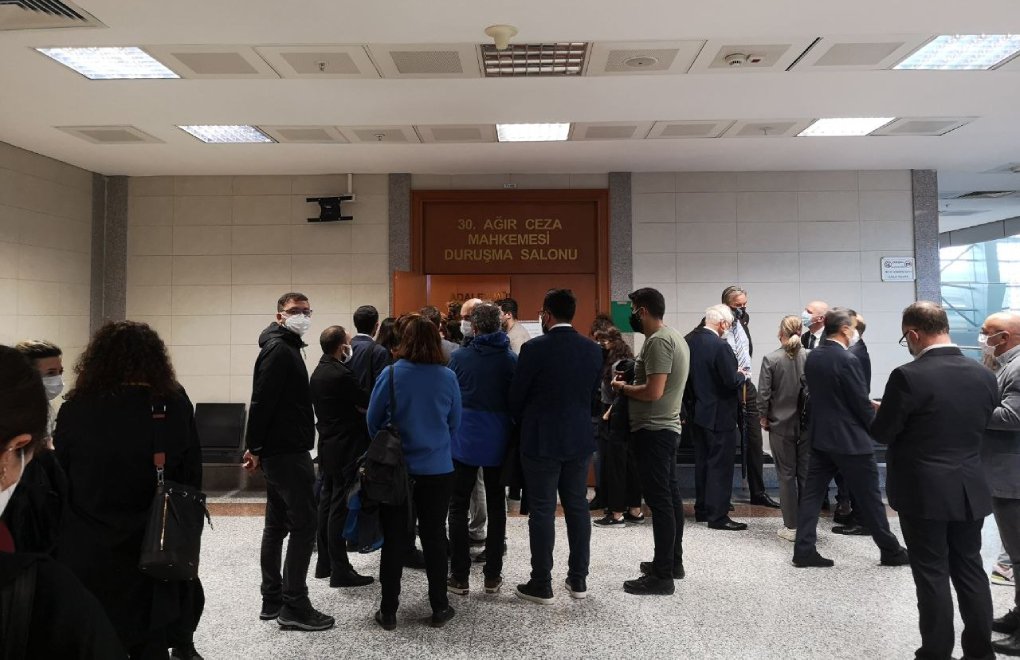
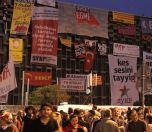
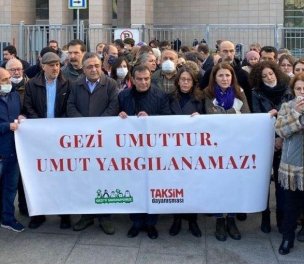
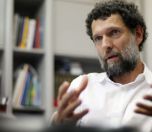


as.jpg)
